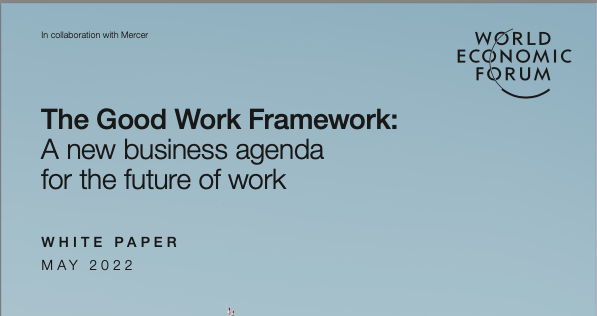Home » The Good Work Framework

The Good Work Framework
Members of the Good Work Alliance co-created the Good Work Framework to help define Good Work and establish a framework for action. The Framework drives progress by identifying the key levers of change, directing efforts and guiding actionable people strategies.
The 6 Pillars of Good Work
As access to talent is increasingly recognized as being critical to business and industry transformation, the imperative for a unified agenda and framework for Good Work becomes paramount. The six pillars of the Good Work Framework provide a structured and actionable approach to steer workforce strategies, driving tangible outcomes. By defining Good Work, we pave the way for a future of work that is more resilient and productive as well as more inclusive, equitable and human-centric.
- Promote Fairness in Wages – Implementing fair wages not only addresses poverty and inequality, but also fosters economic dynamism. Conversely, low wages undermine consumption, weaken the social contract and diminish workforce productivity. Prioritizing fair pay not only supports employees, creating a more stable and motivated workforce, but also strengthens the overall economic landscape.
- Deploy technology responsibly – Technology has the power to increase productivity and improve job quality, but only if deployed responsibly, taking into consideration factors of access, inclusive design, and equitable outcomes.
- Provide flexibility and protection – Companies should strive to provide flexibility and protection to all workers and employment types, including contractual workers and freelancers. Flexibility pertains to workers’ autonomy and their ability to achieve an improved work-life balance. Protection involves ensuring workers’ security in the face of vulnerabilities and unforeseen contingencies.
- Deliver on health and well-being – Delivering on health and well-being benefits companies by increasing employee retention and trust. Moreover, a healthy workforce can bring productivity gains, for companies and economies more broadly. Apart from health and well-being, good work should also provide dignity and purpose.
- Drive diversity, equity and inclusion – Diversity, Equity and Inclusion (DEI) has risen up the corporate agenda in recent years as a succession of global crises have exposed and exacerbated inequalities faced by disadvantaged, vulnerable and underrepresented groups across industries. It is increasingly recognized that strong DEI practices create an environment of improved performance, innovation and overall business success.
- Foster employability and learning culture – Employability is the ability to secure and maintain employment based on a combination of skills, knowledge and attitudes. Cultivating a learning culture involves nurturing a growth mindset among workers, fostering an environment where people are encouraged to learn, reskill and upskill to bolster their employability. Companies adopting skills-first approaches effectively incentivize and reward employability and contineous learning.
Source: Originally published at – https://initiatives.weforum.org/good-work-alliance/gwf
